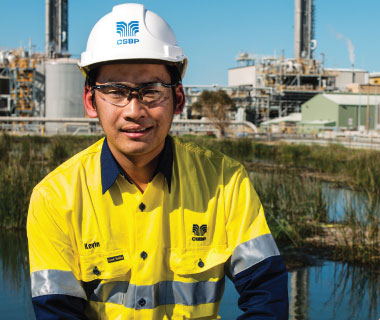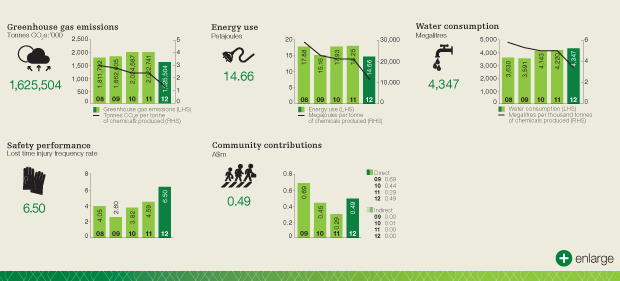Chemicals, Energy and Fertilisers
Energy Efficiency Engineer Kevin Le (left) supports the business in understanding energy usage and identifying potential savings through engineering projects.
More Info
Energy Efficiency Engineer Kevin Le (left) supports the business in understanding energy usage and identifying potential savings through engineering projects.
More Info
Wesfarmers Chemicals, Energy & Fertilisers (WesCEF) operates chemical, gas and fertiliser businesses that service sectors in both Australian and overseas markets.
We also have a 50 per cent interest in an ammonium nitrate facility in Queensland (QNP), but we do not operate the business and it is not included in this report. In August 2011 one of our businesses, enGen, was sold and this section of the report does not include its data. However, material data related to the period of ownership of enGen is contained in the Data Bank.
We have operations around Australia, and our revenue in 2011/12 was $1,786 million.

We continued our focus on the sustainable operation of our businesses for the benefit of our employees, our customers and the communities in which we operate. We remain committed to the safe operation of our facilities in a way that msinimises any adverse impact.
The Wesfarmers Board gave final approval to proceed with the expansion of CSBP’s ammonium nitrate production facility at Kwinana, Western Australia, in December 2011.
CSBP continued to trial nitrous oxide reduction technology in its nitric acid plants at Kwinana to help reduce greenhouse gas emissions. Catalysts have been installed in both nitric acid plants, with some trials achieving an emissions improvement of up to 85 per cent nitrous oxide abatement.
In late 2009, we announced an investment of almost $5 million in a regenerative thermal oxidiser (RTO) to allow us to diversify our phosphate rock supply options.
Following operational testing and trials of various blends of odorous phosphate rock, the RTO was commissioned this year, and phosphate rock from Western Sahara is not part of our import program for the coming production year.
As at 30 June 2012, we employed 1,439 people, excluding contractors but including casuals. The ongoing development of our people is one of our key priorities. During the year, we employed four apprentices and sponsored an additional 13 in our businesses.
Following their introduction last year, we continued to run the WesCEF Women Forums (28 per cent of our employees are female) and this year introduced a women’s development program that is technologically-based and designed specifically to help women create meaningful career paths. In line with our Aboriginal Engagement and Employment Strategy, we recruited an Aboriginal Development Coordinator and awarded one Aboriginal traineeship.
We continue to focus on leadership development and have progressed 101 managers and supervisors through our leadership development framework.
In 2011/12, we recorded 58 total recordable injuries (TRIs), 23 of which were lost time injuries (LTIs). This compares to 55 TRIs and 16 LTIs last year. Our total recordable injury frequency rate increased from 15.8 to 16.4, and our lost time injury frequency rate increased from 4.59 to 6.50.
We implemented a new safety incident reporting tool, Cintellate, to replace existing systems and provide a consistent incident, action management and inspection/audit tracking tool across all our businesses.
We continued providing our workforce with safety training, with a focus on process safety in the chemicals businesses at Kwinana and Australian Vinyls in Victoria; and occupational, health and safety training in all our businesses.
We provide information to and encourage feedback from our employees through our intranet, internal newsletters and employee briefings.
We continue to improve our environmental management systems including the review and assessment of our environmental risks.
During 2011/12, we held workshops to identify energy efficiency opportunities (EEO) in the production of nitric acid, ammonium nitrate, sodium cyanide and polyvinyl chloride (PVC) resins.
The EEO workshops mark the beginning of a new five year cycle of formally identifying, assessing and implementing feasible energy efficiency projects to meet the federal EEO legislation. A number of projects were implemented during 2011/12, resulting in energy savings.
Our 2011/12 Scope 1 and 2 greenhouse gas emissions were 1,493,883 tonnes of carbon dioxide equivalent (CO2e), a decrease of 20.4 per cent on last year. The major reasons for this decrease were our nitrous oxide reduction program and the sale of enGen. Of our total emissions, 46.4 per cent were generated from nitric acid production, 26.9 per cent from ammonia production and 8.9 per cent from LPG and LNG production. The balance was generated from various other processes associated with our operations.
In addition, Scope 3 emissions associated with our electricity, natural gas, liquid fuel, air travel and waste were 131,621 tonnes CO2e.
Our net energy consumption was 14.66 petajoules, a decrease of 19.7 per cent on last year’s consumption. Our energy use is represented by natural gas (92 per cent), electricity (four per cent), and diesel (two per cent), with other energy making up the remainder (two per cent).
Our total water consumption was 4,347 megalitres, up three per cent on last year. We continued to use recycled water at CSBP Kwinana, and Australian Vinyls used 159 megalitres of water from its recycled water plant.
We provided support to a range of organisations in 2011/12 through direct financial support or through the donation of goods to the value of $493,172.
We signed new partnerships with Youth Focus and the Clontarf Foundation, and continued our support of the Salvation Army, and the Asthma Foundation WA.
We also supported our employees’ participation in the Chevron City to Surf for Activ and the HBF Freeway Bike Hike for Asthma, and held a ‘Wear Purple Day’ to raise funds for Breast Cancer Care WA.
We undertake regular internal auditing to evaluate and continually improve our risk management, control, and governance processes.
Our ammonia, ammonium nitrate, sodium cyanide and PVC resin facilities, as well as our Kleenheat Gas production and Kleenheat Gas operational facilities are classified as Major Hazard Facilities and have, or are in the process of obtaining current approvals to operate. We also manufacture, handle and transport dangerous goods.
In May 2012, Australian Vinyls received certification against the international standard ISO14001 for Environmental Management Systems for its PVC resin production facility at Laverton, Victoria.
During 2011/12, the number of audits in the WesCEF internal audit program was significantly increased. This provides greater assurance of compliance together with opportunities for improvement in business performance across a broad range of processes.
During the year, the emergency response team based at CSBP Kwinana took part in an on-site exercise involving the local Fire and Rescue Service, including a full muster of people on-site. The Kleenheat Gas production facility at Kwinana also exercised its muster capability.
In November 2011, ModWood received improvement notices from Worksafe Victoria regarding dangerous goods signage, risks associated with falling, manual handling and auger use. All improvement notices were complied with.
During the year, Kleenheat Gas received improvement notices from Worksafe Victoria for its Deer Park operations relating to systems of work, LPG tank safety valves, risk control measures, and control of ignition sources. All improvement notices were complied with. In November 2011, Kleenheat Gas received a directive from Workplace Health and Safety in Queensland regarding its Pinkenba site requiring further detail on identified control measures and key safety management systems. The directive was complied with.
During the year, Kleenheat Gas received two remediation notices from the Department of Mines and Petroleum in Western Australia regarding its Busselton and Margaret River sites. The notice for its Busselton site was complied with, and actions to comply with the notice for its Margaret River site are underway. In February 2012, Kleenheat Gas received improvement notices from Worksafe Victoria for its Wandin North operations relating to the review of its fire protection report, internal and external inspection of boilers, pressure vessels and air receivers. All improvement notices were complied with.
During the year, CSBP reported two exceedances of environmental licence limits to the Department of Environment and Conservation. The first was an elevated stack test result for fluoride and the second was an elevated monthly average load for manganese in waste water. CSBP has not been advised of any regulatory action.
Australian Vinyls reported an elevated stack test result for ethylchloroformate to the Environmental Protection Authority (EPA). Corrective actions were identified and applied and the EPA has indicated it is satisfied with these actions.